#nasu said fgo was about roman's way of life
Text
Everytime I see a “Crypters wouldn’t have made it past the Singularities!” I want to remind those people the only reason Guda does is because of Mash and Roman.
Arcade showed us that multiple “Chaldeas” (which we don’t know where they come from) fall to Draco’s Testament World fake Singularities before she even manifested as a Beast (Draco is still a larva until Babylon chapter of Arcade, and she was probably not even that before Arcade story). If we take Merlin’s word in Camelot, those Chaldeas lack Romani Archaman (which Merlin refers the “true” Chaldea always has Roman), so even with Mash, Guda fails and dies. Kirschtaria, when he acknowledged Guda as better Master, does it calling them the “Master the Doctor raised/trained” rather than the “Master who beat Singularities and rolled dozens of waifus/husbandos.” Even after Roman died, he remains the most important foundation for Guda’s entire character arc and strength. Mirror of Lost Will and the Aphrodite’s song are highly revealing about this. Without Romani, Guda would have collapsed mentally and perish there.
It’s highly telling how Arcade ‘Chaldea’ only could get it far by receiving the benefit of mobage Chaldea’s previous bonding with Servants except for like 3 of them (even Draco and Proto Merlin are interested on Chaldea because of mobage one). And they didn’t take an active part in besting Sodom Beast, unlike Mash’s and Guda’s confrontation with Goetia (and emotional taming of Fou), but required Arthur who leaped from another world with ferry Noah to show up and call it a day. Guda and Mash by themselves don’t seem like a winning team, IMO. That’s why the FGO premise promotion included meeting of ‘fate’ with three characters, not two.
Roman himself was influenced by their meeting as well, nobody denied that, but trying to take Guda in a vacuum is a narrative mistake.
This is all to demonstrate that of course, Team A members on their own, without their fateful person that pushes them to reach their potential as Master would fail (unless those are Kirsch or Daybit who are cheat characters), but so would have Guda without theirs. That’s why Kadoc has a chance of victory with Lostbelt Anastasia too.
#fate grand order#blah blah blah#meta#the story needed guda#mash and romani to enfold#and be like that#guda by themselves would fail without their previous meeting and training#nasu said fgo was about roman's way of life#this is basically the CORE of the story#even after his death#remains the core#through chaldea#mash and guda#sheba's interlude and ordeal call prologue plus lb7 epilogue made it absolutely clear too
98 notes
·
View notes
Text
Random FGO Potential Plot ideas since DW wont do it so i have to do all the work
- Romulus content. Romulus is one of the most powerful and divine of all the kings and its hella interesting that he's the only one who succeeds at taking the backseat for his successors compared to the likes of David and Iskandar.
- Caster Cu Content. God, pls. He is the Cu who escaped his horrible end, even when comapred to Cu Alter, but he is despondant over it. That being said, he ends up adopting the sensei moniker to help Mash and was the first Heroic Spirit to do so, and we haven't seen him since. Pls let him tell Maah how proud he is of her progress pls Roman is gone and Lancelot sucks at parenting
- Have Artemis and Caligula interact in some way since Diana literally is Artemis under a different name @DW what did she do to him. Its implied in her interludes that the reason she's like that is because as a goddess she cant really express her feelings in a normal way but cmon DW give me the forbidden lore
- whereismuramasashirou.png
- maybe give Bryn some closure with Siegfried?? Like Sigurd even as he appears is more of a persona given life compared to the actual person siegfried is so wheres the closure with that
- is Edmonds ability to permanently murder Dead Apostles ever gonna come up again? The Treasure of Monte Cristo was an ability that perfectly recreates an existance which is extremely interesting considering that Edmonds whole character is about how "He is the Count Of Revenge that will NEVER change", not to mention that its also an ability that, despite being from modern times, is equal in power of that in the Age of Gods, not to mention it opens the connection to all the other Nasuverse stuff that Nasu tries to hide from us
- Will we ever get the scene where Martha fist fought Jesus himself and became his follower because he won that fight
- David. Please. His son saved us in part 1. Give us some more David...
- When will we finally just attack the modern day Magus Association and tear it down. They already were responsible for things going wrong in part 1 fgo and then try to condemn us in part 2 because we showed them up, so after we murderize the crypters how about we just stop Magus Society in general
- More on that, Guda is the perfect antithesis to both the Magus Association and also the Age of Gods. Both God and Man constantly pushed for their separation, more apparent in Gilgamesh's creation, but Guda managed to re-unite both Gods and Humanity via their efforts in Chaldea. They lead the entirety of Panhuman History against Goetia and proved that Gods and Humans can coexist.
- Does Fate/Requiem happen because Guda re-introduces magic to modern society pls tell me
57 notes
·
View notes
Text
Meta, rewriting endings, love and hope: a story of roman(ce)
With the event over, I can freely analyze things I’ve brought up when it originally run.
First, to clarify, this event was based on a FGO spinoff novel of the same writer that "Guda possesses a random person invited by Juliet and gets embroiled in a murder mystery" event (also made a novel). The novel included all endings and was set during or after Sin, so Roman wasn't there but Sion instead. Nasu rewrote the event with help of other TM authors (that took care of their respective characters) to appeal to most people. The end result is a meta-analysis of the relationship of authorial intent vs audience vs actors that have different priorities or tastes. I think it was also a meta analysis of FGO.
While Murasaki's text has Miguel and Gabriella as a platonic version of Genji and Murasaki, Mash is seemly affected by this kind of unconditional love story between foster father and their daughter and wants to rewrite the ending (even if it would remove her beloved senpai from the final footage after that was a wish to include them) and she gets her to wish to not invalidate what was shot but also include this. All thanks to Moriarty who, with Roman's assistance (or rather Roman with Moriarty acting as his mask), delivers the ending she wants.
Now Murasaki's wishes to see her work come to life are understandable, but why Mash was so affected she even had her senpai deleted from the final product? Because of this:
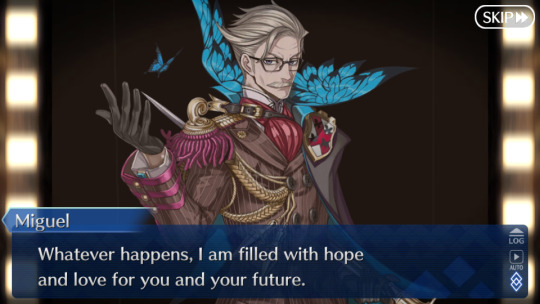
For ten years, a paranoid, kind man toiled hard to make everyone's lives better, specifically, he wanted to see his beloved daughter's future. Those who knew him were loyal to him because of his love for his mission and people. Those who didn't regard him with suspicion and wrote him off as a bad person. He ended his life himself so the rest could go on without him for the greater good, and left foundations to protect his hard work and child.
While Murasaki said this was Genji and Murasaki, anyone who plays FGO unmistakably knows Nasu was drawing a parallel to Mash and Roman situations (without specific supernatural elements). Including how Servants mistrusted Roman until the truth was out except those who could see his real self like Da Vinci. IMO, it's Nasu also saying that FGO (part 1) isn't about your favorite Servant (secondary cast of people meant to meet Gabriella) or Guda (made a symbolic camera-man/woman not even character with their own story), but a story about a father's love for his daughter's future and that daughter’s growth after meeting new people. That’s their story of love and hope. Like Gabriella, Mash understands that the one who loved her the best is none other than Roman.
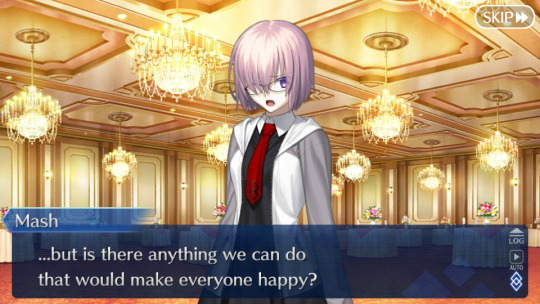
There is also another theme inserted with may or may not concern part 2, the idea of rewriting endings to reach a happier conclusion. It's not the first time Mash expresses this:
Let my memories with you end in sorrow.
Just like you said,
The conclusion can be repainted, always.
(Blank Space, Arcade OP, but it is Mash's feelings after her loss at the end of part 1, about Roman, of course).
The event doesn't actually address what happens with Nursery Rhyme's beloved and lost peppermint green book (addressed as a "he") even if Moriarty says things lost can't be recovered, he indeed restores it back to Nursery Rhyme according to the original novel. But the ending has changed because they didn't know the original ending. While something in the book changed superficially, the contents are still the same, if you look closely, everything is there which soothes Nursery Rhyme's sorrow. She has her book back. How will this tie to Mash's desire to thank Roman and reward him, who knows. It might be unrelated or not. But the ending of the movie in the game was this (unique and presented because of Moriarty-Roman collab):
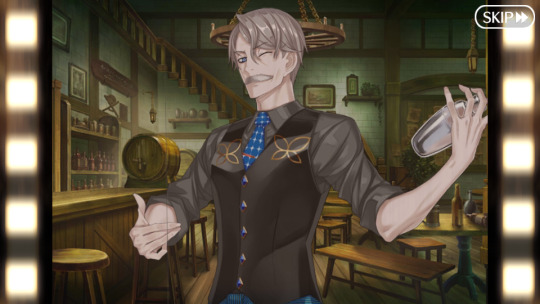
(Like Miguel after his death, Roman is present in this event, watching over despite the impossibility, how his beloved daughter has fun with her friends. Of course is also to add the ambiguity about their finality).
A story with romance or romantic POV is a way to translate what Roman says at the end (and what Nasu says in general about FGO), but the interesting is lost in a double pun (kinda badly translated Roman didn’t say Moriarty had it, but this story was the one that had it). Because it could also be translated as "a story with Roman" (yes, that phrase has ロマン which could also mean romance or romantic but also means the character's name). The mysterious director (probably meant to be Roman as he is an acting director) wishes are prevalent in the story of the game, while trying to guess Nursery Rhyme’s book ending is more focus in the novel (but the metaphor for Mash and Roman still stays though).
39 notes
·
View notes
Text
The reunion with someone you love, thanking someone who was unrewarded, saving of the pitiful who cry for help: universal themes in events and their connection to Roman and Olga
Benienma's charming New Year event ended and there were lots of good moments. Specially for Fionn fans who finally got their favorite to take the spotlight. Fionn is in Ireland, the equivalent of King Arthur, just like Cu Chulainn is the equivalent of Herakles, so the way FGO has handled him was horrible so far but he came around in this event and got impressive feats on his own. But I won't talk about Fionn, others have done before this. When this event dropped years ago, I and a lot of japanese players felt certain uncanny emotional parallel with Beni's old man and Mash's situation with Roman. A man who never knew happiness for themselves and always thought about the happiness of others, cloaking themselves in big lies, misunderstood alive but grieved in death. Who still died smiling because others were saved and happy, yet still they want to thank them and set things right, even if it's an impossible wish.

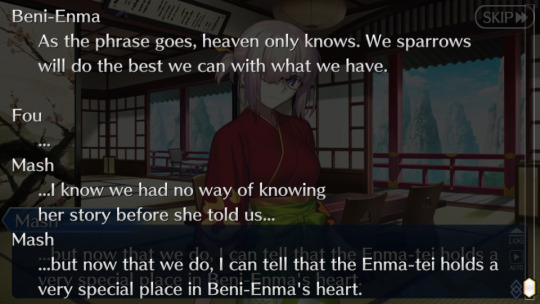
Mash is the one who speaks up, while she doesn’t overtly voice her parallel, we know it exists.
If I am to only fulfill my role between larger gears,
There isn’t much to worry over,
If “only” is good enough.
I’d like to try living, in the time I was granted.
I don’t fight to suffer,
Just like you said.
Please, let the gentle rain fall upon me, upon our will.
When I depart, I’d like for you to quietly see me off.
When I was done crying, I could no longer hear your voice.
That’s how you urge me on, I see, telling me that there’s no road back.
I was born into this world to live.
There is no other definite reason.
I don’t need a mission or a meaning.
I will live! I don’t want to
Let my memories with you end in sorrow.
Just like you said,
The conclusion can be repainted, always.
Cut for length.
This is the song for her mental and emotional state after what she lost at the end of part 1 (Roman). It’s called Blank Space, it shows that, like Benienma, she’s continued her duty for the chance to see Roman again. This post isn’t about Roman, but also about Olga, since the prologue of Part 2 there are two heavy losses that weight Mash’s heart (also the player but Mash’s more vocal about it): first is her guilt of being unable to save Olgamarie (which was discussed and was the reason they went to save Goredolf) and the other is her sorrow with the separation with Roman whom she didn’t even properly thank for everything he did for her (was hinted how she is comforted by his room in Missions before being tore apart from it in the prologue where she had a breakdown and refused to leave). Events in FGO sometimes don’t exist in isolation, they connect to major plot arcs: Ooku continues CCC and is about the major plot of the Beasts, for example, Oniland and Christmas 2020 with Karna supply dragon lore which surely will be important in Britain Lostbelt or when Arthur confronts the Beast of Revelations. Plenty of events to build the Greek Pantheon and characters. As such, there are these small emotional catharses of events that are sometimes connected to the main characters (Mash and Guda) own desires and wishes. The desire of Guda meeting the one(s) he loved and lost again is ever-present, even in interludes:
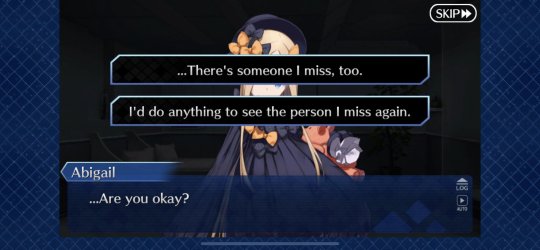
(Abigail interlude)
The person singled out for this is always Roman. Aphrodite's song illusion in Guda's heart led toward Roman and is a mere possibility he was around (even without a blank without body, even without understanding what he's saying) what broke in Guda's defenses. It was always when they gave in about the doctor when the loop was allowed to continue. It was also the source of strength to break out of this. Because Guda can't face Roman unless they are proud of their answer and path, in death or life, they can't thematically meet again (exceptional events aside) until Guda is satisfied with their actions. Events sometimes feature this Roman-loss theme, or rather about being reunited with someone you separate from and lost what is the conclusion of one's journey: Sitonai reunites with that Berserker in Oniland, Beni with the old man, and there's that movie singularity that was all about a man who was misunderstood and made a villain by people who after his death realised their mistake and understood he loved his foster daughter's future and would protect it with his life. Mash was personally touched by that script (so was Roman, who was included by Nasu changing the original novel that was going to be published, to help the cast reshoot the movie for Mash's sake) and wanted to ensure to preserve it, the end of the movie is the daughter living well while the father is watching over, apparently alive, but with a different appearance who one day might meet his daughter again.
The other point of emotional struggle is to help or save those who pitifully want to be saved. While the reunion is nearly always involving a man (sometimes a father figure or someone who was a guardian), the saving part is almost always about a girl, usually, a girl who is doing evil actions and needs to be put down for the sake of others but Guda and Mash (if she’s around) refuse. Imaginary Scramble features two of them: "Gogh" (Clytie) and Yang Guifei. The Olga factor goes tacit in all but the male exception, Goredolf was a man, but the Olga connection was brought up explicitly in his case. This plot-line might have started with Ereshkigal Christmas event and Salem (on that note, Abigail's search and longing for her dead friend also connect and echos with Guda's losses). This started after part 1, because during Observer, those who were twisted or darkened or made villains were disposed of instead of saved (Ushiwakamaru in Babylonia for example, or all the Servants affected by madness in Orleans). Because it was not important during part 1, but it is for part 2.
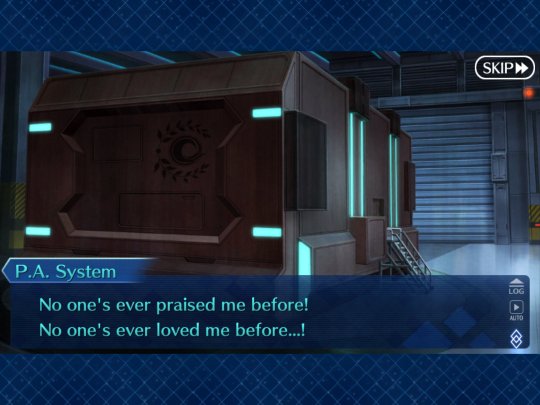
(in a nonsubtle way).
IMO, the Greek Lostbelt was also a climax to voice what Mash’s (and Guda’s) wants. Mash finally breaks out and says she wants to meet Roman again and thank him for everything after the Person of Chaldea appears. They aren't speculating about his identity or his warnings, rather they are emotional about how he can't be the Doctor because his eyes are different and wish to meet him again in an emotional My Room scene. Olympus was for Olga, after U Olgamarie appears and they are left confused by her actions, that is Olga but she's their enemy, a Beast, but still they want to help her. Because that's always been one of their biggest regrets. Greek Lostbelt kicks the course of their personal emotional catharsis arc: Olga is there, but she's an enemy; an ally who resembles Roman appears but he's not their doctor. Man of Chaldea and U-Olga have the same function: to be different kinds of emotional hurdles Mash and Guda face, aside from their role in the plot (obviously they are more important than just angsty plot devices). So it begins their personal goal: meet Roman again, save Olga. Atlantis and Olympus also have a little of both. Olympus with that dream which had an emphasis Guda's feelings toward Roman, among all their losses, while Atlantis with the subplot of Corday and the nanomachines (which the priestess witnessed).
To wrap up, this is merely tangential, but this scene was translated at last, so I might give context to those who don't know it:
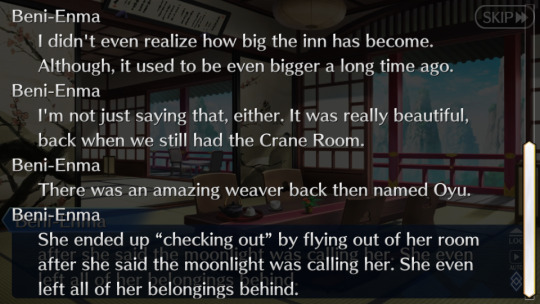
This weaver is "Miss Crane", who appears in Waltz in the Moonlight Lostroom, a special game released on anniversary with the plot by Nasu. Just to show how tied is Roman's story and Benienma's event narrative. The doctor created the Moonlight Room, that became a harmless singularity that exists linking past and future, similar to the Inn. Crane manages it by his request and one of Crane's goal is to reward him, even with the little she could do for him. Roman gets the broadcast of the Ball Crane arranged for him in the game’s ending. This foreshadowing that leads back to Roman was included in the same chapter Beni tells us her backstory and her wish to thank and meet that man again. And she did, in the very end, as a personal reward for her efforts, and his.

(Fate/Grand Order is a story of many meetings and departures, and meetings again).
Note that because I interpret that Mash’s and Guda’s emotional catharsis arc require: needing to help Olga (to exercise their regrets), and meeting Roman in the end (as reward), it doesn’t mean that Olga or Roman will be alive or playable in the end. Olga could sacrifice herself as Corday or Ophelia did after being saved (her choice is going to be important, because it seems build up for her to finally make a stand she wants), Roman can be met in a death-state or in the Lostroom/Moonlight room as connection of past and future. It’s just that those things needed to happen for the emotional closure and they have had a built up before the Greek Lostbelt.
40 notes
·
View notes
Note
Why do you think the fandom is so willing to forgive or like Goetia/U Olga/Tamamobitch but condemn Lev despite the former doing worse shit?
Hmmm. Good question. I'm going to focus on Goetia vs Lev, because touching the girls is difficult when their arc isn't done. Disclaimer: I guiltily admit liking Goetia over Lev too. I don't wanna say because he's hot, but I think that plays a role he doesn't look like a Leprechaun with crazy hair who shops his ties at Hot Topic. Spoilers for part 2 ahead.
But that aside, I think is because Goetia was more honest toward the end about his feelings and being better written to be a more palatable tragic villain to the readers. Also while the flashback of the motivation was for all the pillar demons, the readers take it as exclusively as Goetia's (which is natural reaction/misconception, including mine, I forget). In the beginning, and until like the destruction of the hive, Goetia did not have a sole ego, he was a sum of the individual pillar demons, being a spell that worked as "administration bureau," but Goetia did not have an individual personality. That's why when communicated with others, it wasn't a "Goetia" who spoke, but a different pillar demon emerged to interact with people depending on who addressed him. That's why Dantes said he was "like a mirror". Goetia started to develop individuality and ego slowly by identifying first as "Solomon" or the cruel villain image the pillar demons had on him so he switched between "I" and "We" when he talked. Since Solomon the cruel was their king, the administration office became it.
After the hive collapsed, Goetia was born as a person, but not before, it was a brief life that was being consumed away by Ars Nova that died feeling a sense of satisfaction and joy. I also love the fanart and doujins Goetia (hot blond and naked) existed before this and snuggled up with Solomon, but sadly I don't think he did. He was born and died in that instant as a human being. His arc is a lot more finished and explored, enough for Guda (= the players) to understand the motivations and feel bad about him and his misguided way to help humanity without realizing all demon gods had that same motivation.
Lev meanwhile was not as smoothly written, although there was material about his motivations and struggle, this was buried with his extra characterization and with his insincerity (which I didn't take into account until later I re-read all, Clocktower 2015, Nasu's journal notes about him, etc). He also suffered some mistranslation in NA which favored Goetia and affected Lev's layers. What was that? In NA, it says Goetia wanted to save Mash for a measure of uncertainty or something like that existing in him, it makes it look is Goetia's choice and idea. But in the original, while Goetia went with it, it's because specifically one pillar (which Nasu affirmed in his blog was Flauros, but really who else could have been) had doubts about this plan and wanted to save Mash. It's Lev who wanted to save Mash and why Goetia made that offer. But Flauros, who according to Nasu humanized/became emotional before any other demon, lashed out/instigate the ones he felt empathy toward. That was why he's the only individual demon pillar in the Temple who emotionally confronted Chaldea. It's not fully explored, but it sounds like Lev human personality and his emotions shortcuited and made him an angsty demon when he became Flauros and was trying to cover it up. He was also the only pillar demon with doubts about their grand feat, Goetia's entire questioning came from him. So it was still the Flauros-side of Goetia (before he became an individual) that largely influenced his more complex characterization before his birth as Goetia the human and individual at the end.
I think Roman understood and forgave Lev in their exchange. I think he and Da Vinci realized his dilemma. They realized Lev, if he hadn't been integrated into the hive as demon god, would have never turned against Chaldea. Why would Flauros who by right should cease to care about the human bonds Lev kept bring up Roman hiding his skill as if he was hurt despite his intention to kill him (and all humanity for fuel! Nothing personal)? Because he did care at some level still, IMO, even if he refused to acknowledge it and this made him act even extra assholeish about it because, unlike the other demon pillars, he was suffering human emotions (Nasu said others will develop some, speaking of the Epic of Remnants ones, but Flauros was the first). Da Vinci being petty and fabulous rubbed into his face that Romani didn't trust him for real. She wouldn’t have done that if she didn’t know he was bluffing at some level, imo. Lev as a character with multiple personalities, egos, and emotional issues that contradict each other was already explored (in a different light) in Clocktower 2015, so feels like Nasu took for granted we knew this all along.
One of Nasu's weaknesses is that he sometimes relies too much on his players to read or watch other extra material, mats, or his blog when he should have inserted it in his game. Because Lev is a character who, much like Olgamarie, is given exploration outside the game, we (and I include myself here) are more naturally inclined to forgive Goetia and find him a tragic anti-villain, even though he was the Human Inciniration, the one who killed Mash and the reason why Roman died, over Flauros, who was the only pillar demon who doubted things even in FGO (and in other worlds killed himself to stop Goetia) and whose worse actions were being mean and blow up a bunch of cannon fodder (I love Team A, but they were not characters in part 1, Sylvia and Dustin in part 2 prologue had more characterization than Masters without names) and Olga (who ended up being part 2 final boss-for now- so he had very good reasons to try to take her down - and we see in Melty Blood crossover, he still struggles a little with the choice of killing her or not) in the game prologue. This is all caused because of the lack of exploration in the game and a clumsy handling of the character.
13 notes
·
View notes